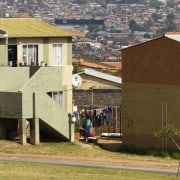|
Getting your Trinity Audio player ready...
|
 Municipalities are complex institutions with a wide range of powers and duties. It is important to know who the officials and role-players in municipalities are, and to understand their duties and responsibilities. They are the people and structures responsible for the efficient running of a municipality, and they are the ones who must answer to the community if this is not the case.
Municipalities are complex institutions with a wide range of powers and duties. It is important to know who the officials and role-players in municipalities are, and to understand their duties and responsibilities. They are the people and structures responsible for the efficient running of a municipality, and they are the ones who must answer to the community if this is not the case.
Municipal elections take place every five years. The difference between national and provincial elections and municipal elections is that in the former two you vote for a political party to get seats in the national or provincial legislatures, and in the latter you vote for a political party and a ward councillor to get seats at the municipal level.
Elected representatives are tasked with ensuring that the needs of the community are met and that the municipality shows steady growth and development. But when corruption creeps into the running of a municipality, it can disrupt service delivery – the responsibility of the municipal council – and can drive a community to protest violently.
“At Ekurhuleni municipality department of XXX our manager YYY steals the department monies. He request materials to be purchased and later that material won’t be delivered. The material ordered and paid but not delivered. Our manager YYY uses our database suppliers, he writes the cheques as he is paying the service provider while he will get back the money from the supplier. This type of corruption is being happening for years. I have documents as proof of what is happening,” wrote a Corruption Watch reporter.
Section 53 of the Municipal Systems Act of 2000 requires that a municipality define the specific role and area of responsibility of each political structure and office bearer of the municipality, as well as that of the municipal manager. This must be done in accordance with the Municipal Structures Act of 1998 and any other applicable legislation.
The municipal council
This is the body that oversees the executive and administration of the municipality – thus the municipal council makes the by-laws for the municipality and takes decisions on behalf of the municipality, making it the municipality’s ultimate decision maker. It consists of elected councillors or members. A municipal council stands for a term of five years but may be dissolved before the end of its term.
The municipal council’s duties include :
- ensuring the provision of services to the local community;
- developing and evaluating the policies and programmes of the municipality,
- maintaining the financial integrity of the municipality;
- ensuring the administrative policies, procedures and oversight policies, practices and procedures are in place to implement the decisions of the council; and
- ensuring the accountability and transparency of the operations of the municipality.
The council makes laws and policies, plans the budget, provides financial oversight, hires the municipal manager, and ensures that the municipal administration fulfils its duties to the community.
A municipal council must meet at least four times a year and must monitor and evaluate the actions of its executive and administration.
South Africa’s Constitution allows for a traditional leader to address a council on issues that affect his or her area and community.
The municipal councillor
A councillor is elected in the municipal or local government elections and is meant to be the link between the public and the council. A municipal councillor is subject to the Code of Conduct for Councillors.
A councillor has to represent the interests of the community, provide it with leadership and guidance, and facilitate communication between the community and the council.
He or she also has to participate in the decision-making process of the council, attend council meetings, and promote local democracy, without interfering with the administration of the municipality.
A councillor is not permitted to do business with a municipality – but in some cases the rules are no obstacle.
“There is a R15,000,000,00 Toilet projects which need to be driven by community members but it not like that it is driven by Councillor’s Friends and their famalies earning R 50,000,00 a month per person and holding 3 different positions per person which each pays R15,000,00/ R10,000,00,/ R10,000,00,” wrote a concerned Corruption Watch whistleblower.
The Speaker
A municipal council must appoint a chairperson, who is known as the Speaker. Besides chairing the municipal council, the Speaker enforces the councillors’ code of conduct.
Section 37 of the Municipal Structures Act of 1998 states that the Speaker is responsible for:
- presiding over and maintaining order in council meetings;
- ensuring that the council meets at least quarterly;
- ensuring that the meetings are in accordance with the rules;
- ensuring compliance with the Code of Conduct for Councillors; and
- other additional delegated functions.
Committees of the municipal council
The Municipal Structures Act allows the municipal council to establish two types of committees – Section 79 and Section 80 Committees.
Section 79 Committees, also known as council committees, are formed by the municipal council from its members. They are established to assist the municipality in performing its functions effectively and efficiently. Examples of such committees are:
- Appeals committee;
- Disciplinary committee;
- Rules committee;
- Oversight committee;
- Ward committee;
- Audit committee.
A Section 80 committee is usually a permanent committee that specialises in one area of work and is sometimes given the right to make decisions over small issues. It may be appointed by a mayor with executive powers, to assist the executive mayor in performing his or her functions.
The executive mayor
A municipal council may appoint an executive mayor, who exercises executive authority and who is assisted by the mayoral committee.
The functions of the executive mayor are laid out in section 56 of the Municipal Structures Act and include the following:
- to identify and review the needs of the community;
- to evaluate the progress of the municipality;
- to monitor the management of the municipality;
- to report to the municipal council on all decisions taken;
- to appoint the mayoral committee; and
- to perform other delegated powers.
An executive mayor must report to the municipal council before taking decisions such as passing by-laws, approving budgets, imposing rates and taxes, taking out loans or deciding on human resource issues such as hiring a municipal manager.
The mayor
A municipal council may also appoint an executive committee – this type of committee elects a mayor to act as its chairperson, but the mayor does not have greater powers than other members of the committee. The mayor presides at meetings of the executive committee.
The executive committee in a municipality is the primary committee. It has the function to:
- identify the needs of the community;
- review and evaluate the needs of the community;
- recommend strategies to the municipal council;
- identify and develop criteria to identify performance; and
- review performance.
The municipal manager
In terms of the Municipal Systems Act, a municipal council must appoint a municipal manager. This individual is the head of the administration and also the municipality’s accounting officer and has to be skilled enough to perform the functions of the office.
The municipal manager is in charge of the day-to-day running of the municipal administration and for implementing plans, policies and budgets.
Ward committees
Ward committees are made up of a ward councillor and a maximum of 10 people who are elected from the ward – an administrative division of a city – and who serve voluntarily on the ward committee. The municipal council determines the rules of electing ward committee members.
The purpose of a ward committee is to assist the ward councillor with spreading important information to the community and encouraging participation in the community.
The ward committee must make the municipal council aware of the needs and concerns of the community, and keep the community informed of developments in the municipal council. The ward committee can make recommendations to the municipal council, but does not have decision-making powers.
Don’t miss our third instalment, in which we profile a proportional representative councillor who works hard for her community.








